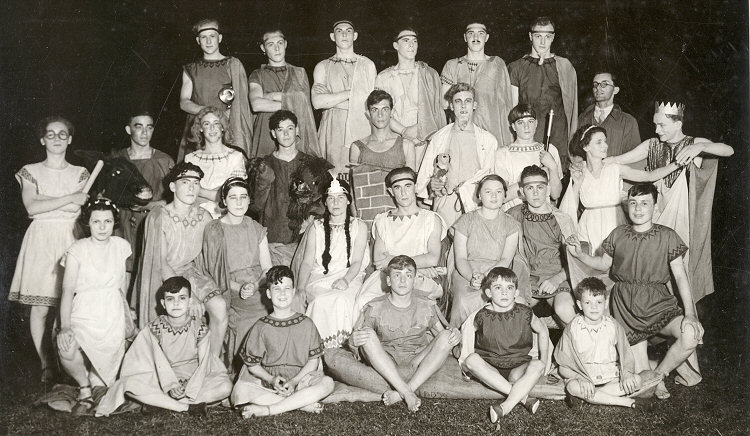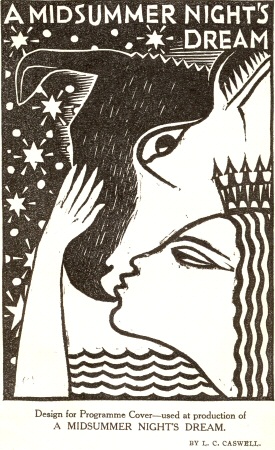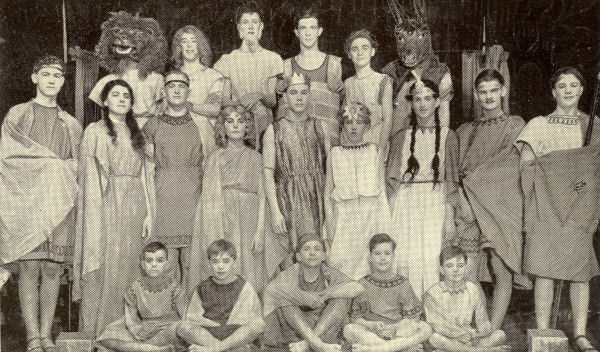 |
| back: S Bailey - L Caswell - R
Caswell - S Banyard - D Tann - F Bye - CW Crouch
(producer) row 3: A Fuller - R Porter - R Cogbill - K Drake - M Norman - H Harding - J Palmer - Miss A Winn - R Wright row 2: Miss Roberts - J Pinion - Miss H Whitelaw - Miss M Waldock - H Peacock - Miss O Usher - L Gilbert - E Smith front: A Bevan - H Lee - F Hockley - P Bedford - J Palmer source: Peter Askem |
Soham Grammarian
Summer 1937SHAKESPEARE IN THE OPEN AIRA glowing and sensitive interpretation of Shakespeare's "A Midsummer Night's Dream" was given on the School lawn on June 30th by a cast comprised of boys from all parts of the School, Old Boys, and amateur actresses recruited locally. The harmonious collaboration of the various elements was very pleasing, as was also the courageous determination of the producer, Mr. Crouch, to present the play without cuts. The incidental music for the production was from Mendelssohn, while the more essential stage properties were supplied by Simmons, of Covent Garden, London. The striking programme-cover designs were entirely the work of the School, one being by F Hockley (Form 4), and the other by LC Caswell, an old boy who is now at the Slade School of Fine Art. The play was acted in the beautiful natural setting of the School grounds, and was the School's first dramatic venture in the open air. Every member of the large audience agreed that the effort should have many worthy successors, and, encouraged by such enthusiastic support, the same company will present Sutton Vane's "Outward Bound" next autumn. The Rude Mechanicals' under-plot was assigned to present pupils at the School, and they evidently enjoyed themselves. They did not, however, descend to mere gagging and clowning, nor did they let their high spirits interfere with their elocution, which was excellent. Bottom (RJ Porter) had a wide range; his rant in the Ercles' vein was skilfully balanced by the softest of sucking-dove interludes. |
 |
In distinctness and beauty of speech, in grace and movement and variety of pose, Puck (Hockley) was the best among the younger actors. His movements were those of a born ballet dancer, and he showed a fine feeling for the flexibilities of verse rhythm. His acting was a sheer delight. Quince (Fuller), producer of the lamentable comedy of Pyramus and Thisbe, was the desired mixture of the ineptly pretentious and the feverish fidget.
Flute (Cogbill) was a superb village maiden half-wit, and his legs-in-air finale in what looked like his great aunt's under-wear was a convulsing climax to his three hours' nimble dancing on the peaks of absurdity. Snout (Norman) was an amiable yokel, clad in a suitably fluid wall. Snug (Drake) was " a most gentle " impersonation of the country clodpole bothered with the task of striking the mean between the tamest of mice and the fiercest of menagerie lions; but the one who tickled the groundlings most was Starveling (Harding), a triumph in the depiction of the deaf, physically decrepit and almost entirely demented.
All the fairies were attractive, the most graceful being Moth (Palmer) and Cobweb (Bevan), although it was Mustard Seed (Bedford), who, matching his keenness with his play name, did the most work, and was the inspiration and driving-power of the rest. Second Fairy (Smith) was the most attractive in person and rhythm of movement.
Of the grown-up fairies, First Fairy (Megan Roberts), had an elfin charm; Titania (Wendy Winn) was delightful in her actions, and showed an excellent stage sense; while Oberon (Ralph Wright) spoke Shakespeare's lovely verse with a feeling and resonance worthy of it : his attack was good, but his movements were a trifle spoilt by a mannerism of raising his shoulders. Otherwise, his dramatic sense was creditably deep.
Of the women lovers, Helena (Helen Whitelaw) was the better, and she got every possible bit out of her part. Hermia (Olive Usher), however, was effective as an under sized spitting she-cat. Hippotyta (Mary Waldock) had the most pleasing voice among the women, and had the Amazonian fire and dignity that the part demanded. Egeus (Fred Bye) dramatically was convincing, but his success was impaired somewhat by faults in elocution.
Philostrate (John Palmer) was a debonair and easy-mannered master of ceremonies; Demetrius (John Pinion) was an astonishing revelation for a first appearance; but Lysander (Luther Gilbert) was lacking in intensity. Theseus (Mr. Peacock) was dignified and regal, and spoke very distinctly, with a rich variety of tone. The attendants (Stanley Banyard, Stanley Bailey, Reginald Caswell, Douglas Tann and Leslie Caswell) were striking in appearance and impressive in deportment. Stanley Bailey (cornettist) would have been indispensable at the Globe for his dexterity in sennets, aiarums and excursions.
Mr TL Riley was a fine stage-manager ; Mr J Lait and Mr VJ Freestone (an old boy) are to be congratulated on the success of their electric lighting arrangements; while special mention must be made of Mr R Sykes for his alertness as a prompter. Thanks are also due to Mr CJ Ford, who had sole charge of the booking arrangements.
WHAT SHAKESPEARE MIGHT HAVE SAID
from the Summer 1937 issue of the Soham Grammarian
An empty seat near the middle of the second row-no one observed me as I took my place in it, a Shade from the Land of Beyond, come to witness the murder of mine own play (and, alack ! a favourite play to boot), by a company of callow lads and rustic maidens!
A delay in opening the proceedings gave me full opportunity to note the staging. I shivered and drew my cloak of invisibility more closely around me; and then I forgot to shiver, so wondrous was the setting to my mind. I have always maintained, when discussing the matter over a tankard at "The Mermaid" that "A Midsummer Night's Dream" should be performed only in a garden. And here was a garden before me, most admirably suitable and delightfully adapted.
But-oh! my play!- I groaned inaudibly as I thought of my blank verse mouthed by those lads and lasses whose curious, clipt, and slurred language I had heard and so little understood during the preparations.
Arid then the play began. I grew warmer and warmer in my enjoyment of it; and no longer was my mouth full of strange oaths, longing to give them utterance. Gone were the callow youths, and, verily, in their place came mine own creations.
Oft it hath vexed me at "The Globe" to witness the awkwardness of the comings-in and goings-off of the actors; but concerning these Soham players I cannot say enough in praise of their exits and their entrances. Each exit was not merely a disappearance from the stage, but was so strongly suggestive of what the player said he intended to do, that it needed little imagination to see him doing it when "off."
I enjoyed the esprit de corps of the players, each playing to weld the parts to make the whole perfect. The unity of a play is often spoiled by the actors straining to be what I believe you now call stars. Not so the Soham players.
My time here is limited and soon I musst be gone, but before I fade away I must speak of Puck. How I wish I had had that boy with me in the long ago, when I myself had a more active part than I had on this occasion at Soham. I fume and fret most furiously when I see the part of Puck portrayed by an ugly ogreish being, whose actions are suggested by spite rather than pure mischief. But the Soham Puck was a delight in every way : his grace and agility, his delicate charm, his dainty dress, his lovable impishness, and, beyond everything, his mastery of the suggestion of invisibility.
And so congratulations to Producer, Puck, and the
other Players from,
The Poet-Playwright.
ONE OF THE AUDIENCE

THE DRAMATIC CLUB: March 3rd 1937
from the Lent 1937 issue of the Soham Grammarian
In the opinion of most people the Rude Mechanicals' Underplot from a Midsummer Night's Dream, which we gave on Speech Day, was the best performance we have given for some time; the elocution was certainly much better. Much rested of course on Bottom (RJ Porter), who combined much hard work with natural ability, and made the part a great success. He has shed many of the mannerisms of his earlier period, and has learnt how to get the utmost out of a part without striking the note of falsetto.
In distinctness and beauty of speech, and in grace of movement, the outstanding younger actors were Hockley (Puck) and Eyet (Titania). Fuller (Quince) was distinctly better as producer of the " Pyramus and Thisbe Show " than as stagemanager among harsh modern realities. Cogbill (Flute) happily discovered just in time the subtle distinction between comic activity and clownish gagging, and was excellent, especially in the last scene. Norman (IVL) (Snout) was good as a sturdy and long-suffering barrel of bricks and mortar, and Drake (Snug) was "the most gentle of beasts in all good conscience," but the one who among the minor yokels covered himself with glory was Harding (Starveling), a triumph of impersonation of the lame, the deaf and the semi-demented. Sykes (Theseus) is to be congratulated on his progress in elocution. His was a difficult part to play, a part almost without action, and if we consider that he came rather late into the cast, we must admit that he acted very creditably.
All the fairies were attractive, the most graceful being Palmer (Moth), and Bevan (Cobweb). Allen (Oberon) was a striking presence, and spoke his lines delicately and sensitively, but was a trifle too impassive for some of the situations in the play.
As women, Dann (Hippolyta), Field (Helena) and Pinion (Hermia) were quite ravishing. Gascoyne was an efficient Lysander, Bitton was an imposing Demetrius, and Palmer (Philostrate) was a debonair and distinguished master of ceremonies and a close rival to Eyet in distinctness and forcefulness of speech.
The incidental music from Mendelssohn's A Midsummer Night's Dream, played by Mr Crouch, ARCM, was delightful, and the dancing of the fairies and of the mechanicals at the end were high lights of the afternoon.
We should like to thank very much Messrs Crouch and Ford for their very effective collaboration in making-up, Mrs RL Thomas and Mrs R Banyard for untiring assistance with curtains and costumes; and our thanks are also due to W Parr for much time spent in the tedious job of prompter, and to K Drake for hours spent in working on scenery and other properties.
If you can add to this page please contact the editor
last updated 14 Nov 2007